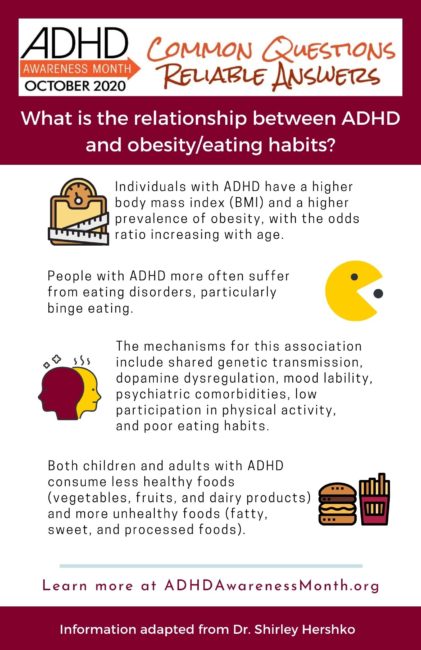Individuals with ADHD have a higher body mass index (BMI) and a higher prevalence of obesity, with the odds ratio increasing with age. Indeed, the pooled prevalence increase by about 70% in adults and 40% in children. Additionally, individuals with ADHD suffer more from eating disorders (OR=3.82*), especially binge eating (OR=4.13).
Several mechanisms have been suggested to account for this association including shared genetic transmission, dysregulation of dopamine, mood lability, psychiatric comorbidities, and low participation in physical activity, impulsivity, inattention, and poor eating habits. It was found that both children and adults with ADHD consume less healthy foods (such as vegetables, fruits, and dairy products) and more unhealthy foods (fatty, sweet and processed foods, such as snacks, candies, “fast food” and “junk food.”)
*OR=3.82 means 3.82 times more likely
About the Author

Shirley Hershko is the director of the diagnostic and support center, a senior teacher, and a researcher at the Hebrew University in Israel. Her study won an award at the World Congress on ADHD.
References
- Hershko S, Aronis A, Maeir A, Pollak Y. (2018). Dysfunctional Eating Patterns of Adults With Attention Deficit Hyperactivity Disorder. J Nerv Ment Dis. https://www.researchgate.net/publication/328663673_Dysfunctional_Eating_Patterns_of_Adults_With_Attention_Deficit_Hyperactivity_Disorder
- Egbert AH, Wilfley DE, Eddy KT, Boutelle KN, Zucker N, Peterson CB, Celio Doyle A, Le Grange D, Goldschmidt AB. Attention-Deficit/Hyperactivity Disorder Symptoms Are Associated with Overeating with and without Loss of Control in Youth with Overweight/Obesity. Child Obes. 2018 Jan;14(1):50-57. doi: 10.1089/chi.2017.0114. https://www.ncbi.nlm.nih.gov/pmc/articles/PMC5743031/
- Cortese S, Moreira-Maia CR, St Fleur D, Morcillo-Penalver C, Rohde LA, Faraone SV. (2016). Association Between ADHD and Obesity: A Systematic Review and Meta-Analysis. Am J Psychiatry. https://ajp.psychiatryonline.org/doi/10.1176/appi.ajp.2015.15020266
- Nigg JT, Johnstone JM, Musser ED, Long HG, Willoughby MT, Shannon J. (2016). Attention-deficit/hyperactivity disorder (ADHD) and being overweight/obesity: New data and meta-analysis. Clin Psychol Rev. https://www.ncbi.nlm.nih.gov/pmc/articles/PMC5247534/

